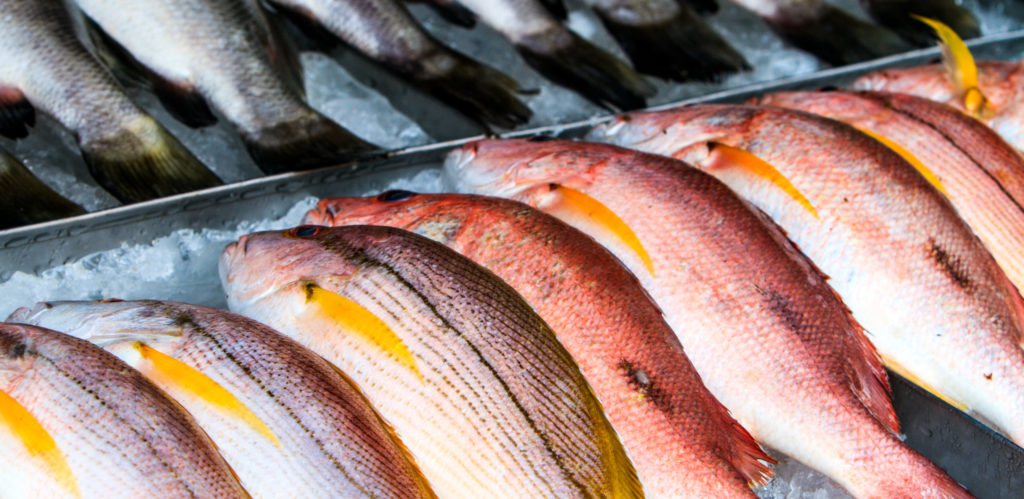In the seafood section of today’s supermarkets, consumers are treated to brightly lit refrigerated showcases filled with colorful salmon, trout, sea bass, red snapper and shellfish. For the modern seafood shopper, fish color is an important indicator of its quality and freshness.
Despite language of “color added” being mandated on labels by the US Department of Agriculture, most consumers are unaware of the fact that synthetic color is often added by feed manufacturers to aquafeeds in order to mimic the pink of wild catch. Farmed salmon is a classic example, for without the added color, it is gray.
The group of chemical compounds responsible for seafood pigmentation is known as xanthophyll carotenoids, and includes astaxanthin, lutein and canthaxanthin; the primary one is astaxanthin (pronounced “asta-ZAN-thin”). With the exception of organic seafood, the astaxanthin in farmed food is predominantly synthetic, a relatively inexpensive petrochemical made to substitute for natural astaxanthin found in microalgae and other organisms in the food chain.
Until now, natural colorant has been scarce and expensive. Demand for natural astaxanthin is high, but is cost-prohibitive with legacy microalgae production technology. That is changing with Kuehnle AgroSystems (KAS), whose groundbreaking algae-growth technology is positioning the company to become a product leader for natural algae ingredients, including astaxanthin in a variety of markets.
Hawaiian microalgae naturally possess exceptional concentrations of protective, pigmented antioxidants to combat the sun’s harsh rays, and these are coaxed out using KAS technologies. However, microalgae have been dependent on sunlight-driven photosynthesis in order to grow, which makes it difficult to produce the very large volumes needed for feed and food materials. KAS discovered how to nurture algae to grow efficiently in total darkness and to quickly produce high amounts energy and nutrition compounds along with useful carotenoids. This method allows the algae to be grown fermentation-style, indoors in food-grade stainless steel tanks similar to beer vats in breweries.
In this way, KAS practices “vertical farming” for scalable natural products with sustainable water and land use. The algae achieve remarkably high densities in the tanks, drastically reducing their water footprint. Producing natural whole-cell nutrition from algae grown in the dark is the company’s forte, with patents pending. Significantly, the KAS technology substantially improves the unit economics to a point where natural algae can replace synthetic or unsustainable ingredients in foods and other products.
Kuehnle AgroSystems’ founder, Heidi Kuehnle, PhD, is highly experienced in natural color. While a professor in the College of Tropical Agriculture and Human Resources at the University of Hawai’i at Mānoa, her lab’s research for over 20 years focused on flower color among orchids and anthuriums. Her research, which has resulted in over 80 publications including two co-authored books, led Kuehnle to study pigment biology found in single-celled organisms such as microalgae.
Pigments not only provide color, but they are a source of biologically active compounds for healthy anti-oxidants and anti-inflammatories delivered as dietary supplements and for topical use in cosmetics. For Kuehnle, the formation of a company was the next logical step in order to steer her cell technology out of the lab and towards commercial applications.
Helping in that transition is HATCH, a venture capital firm that runs the world’s first and only aquaculture accelerator program. HATCH invests in companies that provide technological solutions to industry challenges while providing better and more sustainable products. This unique program is in partnership with the Natural Energy Laboratory of Hawaiʻi Authority (NELHA), the Hawaiʻi Strategic Development Corporation and the University of Hawai‘i’s UH Ventures, LLC.
Headquartered at the NELHA’s Hawaiʻi Ocean Science and Technology Park in Kailua-Kona on Hawai’i Island, HATCH provides strategic advice to KAS and other startups on business and financial matters, which includes matching products to their ideal markets to maximize impact.
“The HATCH accelerator is an exciting opportunity to place Hawai‘i on the global aquaculture innovation map,” said Steve Auerbach, interim director of the University of Hawai‘i Office of Innovation and Commercialization. “It serves as a perfect complement to our growing suite of innovation and entrepreneurial programs designed to get game-changing UH-based research technologies like Kuehnle AgroSystems into the marketplace.”
Having completed participation at HATCH, KAS’s innovations and natural, non-GMO microalgae will be finding their way into aquafeeds and foods. In December 2019, their new ingredients were announced in the final event of the HATCH accelerator program in Singapore. While not yet in the market, their products are garnering a lot of attention from feed manufacturers and also from food supplement distributors eager to meet growing consumer demand for natural nutritional ingredients that conserve water and land resources.
KAS’s dedicated team of scientists has also succeeded in using the same fermentation process for producing a tasty protein-rich whole algae food ingredient. Unlike farming cattle or even soybeans, there is no polluting run-off and no use of pesticides. “Today’s production of protein uses up water and land at levels that threaten humanity. One ton of our algae protein uses only a fraction of water, with 100- to 1000-times less water than soy or beef, respectively, and no rainforests need to be cleared for farming”, said Kuehnle. This is shovel-ready technology to help address the need for locally-produced protein for the Islands’ food security. Armed with support from the Hawai‘i Department of Agriculture and engineering design, KAS is seeking financing to build its first vertical farm.
“We could not have arrived where we are without the amazing team from HATCH,” noted Kuehnle. “This was our first experience with a business accelerator and I would encourage anyone with an entrepreneurial idea that can contribute to the vital industry of aquaculture to explore an opportunity with HATCH.”

